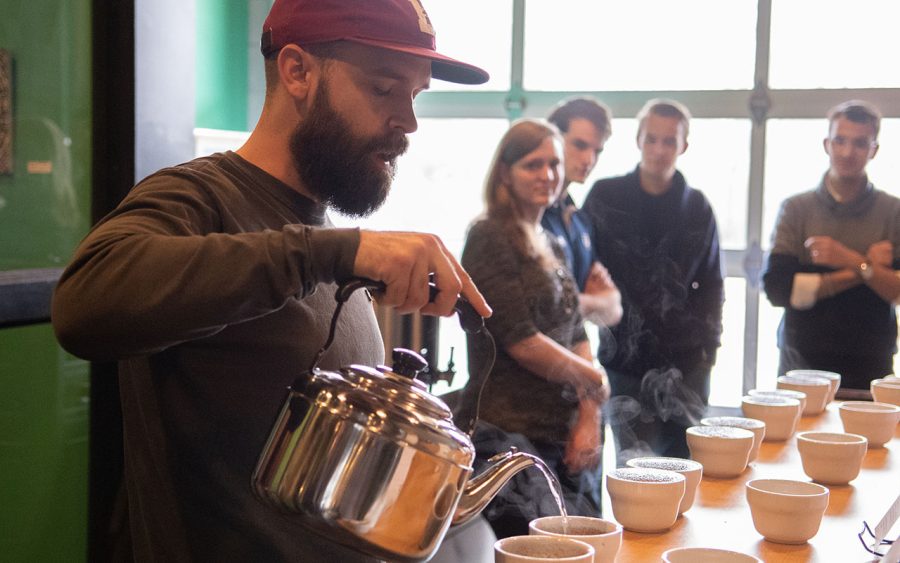Due South Coffee Roasters and Aramark teamed up to hold a contest that allowed three BJU students with one friend each to attend a cupping at Due South in March.
Cuppings are how the coffee industry tests its coffee, a kind of quality control.
The winners, David Bell, Jessica Comperry and Laura Gaston, purchased drinks at Cuppa Jones which allowed them to enter their names into a raffle. After their names were chosen, the three attended the cupping with their guests at Due South Coffee Roasteries on Hampton Avenue, a location Due South moved to eight months ago.
Ryan Hall, manager of the Due South location, walked the winners and their guests through the process of making coffee, from the fruit trees in Brazil, Guatemala and Ethiopia to the mochas, Americanos and drip coffees the University family enjoys at Cuppa Jones and the dining common.
Hall handed out dried coffee seeds that Due South receives from around the world, warning not to eat the seeds unless you wanted a chipped tooth. He then explained how the shop’s coffee roaster transforms the rock-hard seeds in the students’ hands into the coffee beans they would soon enjoy.
He also highlighted how Due South and Aramark work together to provide coffee for BJU. Aramark places their coffee order on Monday. Due South roasts the seeds Tuesday or Wednesday and delivers them Friday, within the peak freshness period.
Next, the six participants entered a back room where the actual cupping took place. Hall explained how cuppings are designed and executed with a high degree of precision.
Different blends of coffee were placed into bowls along a table. Participants then formed a line and smelled the dry grounds, one blend at a time. Hot water was then poured into the bowls. Again, the line filed through, smelling the now wet grounds.
Hall then filled the bowls with water and waited four minutes for a crust to form. During this step, the students broke the crust with a spoon and smelled the coffee. With the smelling portion finished, the line now tasted a spoonful of each coffee. To finish, the group tasted the coffees twice more at different temperatures, which enhance different flavors in the brews.
The point of so many passes at a cupping, as Hall mentioned, is to detect slight variations in the smell or taste. The cupping proved to be quite a learning experience. David Bell, a senior accounting major, said, “I had never thought about how much went into coffee. I was just shocked at how complicated [the process] is.”
Jessica Comperry, a senior health science major, said, “I learned that there is a lot more to coffee than just the grinding and brewing processes. Just because I don’t particularly enjoy a coffee that doesn’t mean it’s bad coffee.”
Nathan Swaim, a sophomore accounting major, added that the cupping made him appreciate good coffee now that he knows the process involved in making it.
Throughout the cupping, the BJU students talked with Hall and Roy Hulehan, BJU director of retail operations, about their experience with Due South coffee on campus, a switch made last semester.
“When [BJU] switched, I really didn’t like Due South coffee,” Bell said. “But I left [the cupping] appreciating it a lot more.”
Bell added that learning about the process that Aramark, Due South and BJU go through in order to provide coffee has made him more appreciative. “Now I think I’m more willing to be less critical of The Den,” he said.
Emily Wynn, a junior accounting major, said the experience taught her how blessed BJU is to have such high-quality coffee.
Hall said student feedback, like that at the cupping, helps perfect the process that puts the coffee in BJU’s mugs. He also explained how the entire coffee industry, and Due South, is continually improving, making each batch of beans and pot of coffee as pleasant and pleasurable as possible.
























































